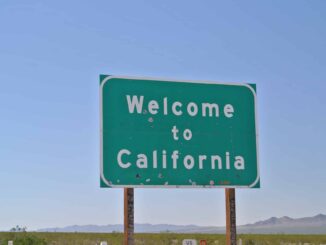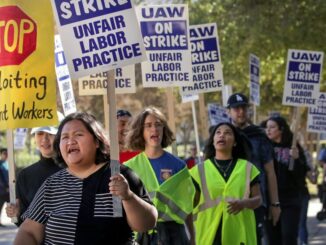
As the housing crisis continues to grip California, its neighbor Nevada finds itself in the crosshairs, facing skyrocketing prices that could potentially sway the political landscape in favor of Donald Trump come election time.
In Clark County, the heart of Nevada’s housing battleground, home sale prices have surged a staggering 50% since 2021, now hovering around $414,000 on average, according to data from Zillow.
Renters aren’t catching a break either, with the cost of leasing a single-family residence spiking nearly 70% to about $1,750 per month during the same period.
With President Biden and Trump gearing up for another showdown in November, the dream of homeownership is fading fast for many middle-class voters in key swing states like Nevada and Arizona.
The culprits? A toxic mix of low supply, soaring interest rates and a population boom largely fueled by an influx of Californians fleeing their state.
Bob Cleveland, head honcho at the nonprofit Rebuilding Together Southern Nevada, knows the devil’s in the housing details.
He points the finger squarely at California, whose residents have been outbidding and outbuying Nevadans for decades. The trend has only intensified since 2022, when the Federal Reserve kicked interest rates into high gear to combat pandemic-induced inflation.
For decades, Californians made up a hefty chunk of new Nevada residents, with Los Angeles now leading the charge as the top city funneling folks into Las Vegas.
It’s not hard to see why: the median household income in Southern California towers above $100,000, dwarfing the $66,000 figure in Sin City.
“Our income is just not on par with California’s income,” Cleveland told the Las Vegas Review Journal. “So our housing prices have gone up because of the influx of California money, and our income hasn’t been going up so it makes it hard for the average Joe to keep up.”
But it’s not just income discrepancies driving the divide.
The average home price in Los Angeles hovers just shy of a cool million, while in Vegas, it’s a comparative steal at $422,000. This lopsided equation tilts the playing field heavily in favor of Golden State transplants, leaving locals struggling to keep pace.
According to Daryl Fairweather, chief economist at Redfin, the housing crunch isn’t confined to Nevada — it’s a nationwide issue. The lack of affordable housing, coupled with bureaucratic red tape stifling new construction, has pushed the market to a breaking point.
“This is definitely the main story of the housing market, the lack of affordable housing and the challenges such as demand outpacing supply and challenges in getting supply online when it comes to acquiring land or construction approval from the government,” Fairweather told the outlet.
“And what continues to be a problem is there is a lack of support for building dense housing where people actually want to live, so homes in really desirable cities with plenty of jobs.”
President Biden, sensing the urgency, has made housing affordability a centerpiece of his recent campaign efforts.
Former Nevada Gov. Steve Sisolak, a Democrat, acknowledges the gravity of the situation, noting that for those shut out of the housing market, the road to ownership grows increasingly impassable.
“I think he realizes the magnitude of the situation,” Sisolak, who was Nevada’s governor from 2019 to 2023, said of Biden speaking to the Los Angeles Times.
“He’s not out there to chase polls, but when you do poll people, affordability of housing is a major issue. If you’re not in the housing market right now, it’s going to be difficult to ever get into the housing market.”
Polls in the past year have shown Trump consistently leading Biden. The housing crisis in Nevada might pave the way for his victory in the state, ending two decades of Democratic dominance in presidential elections.








